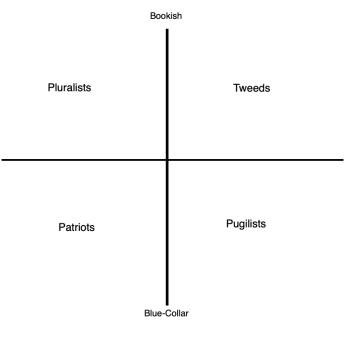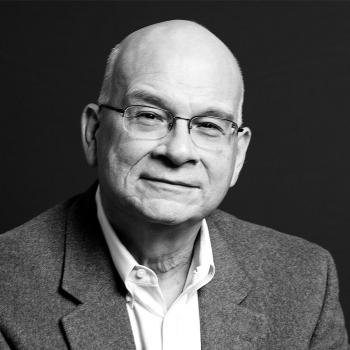 Over at Cranach, my former literature professor Gene Veith has some thoughtful meditations on youth groups and youth retention. As a (somewhat) more recent product of teenage catechesis, I thought I’d weigh in on the question Veith poses at the end of the post: as a young person, what pulled you into the church, and what drove you away?
Over at Cranach, my former literature professor Gene Veith has some thoughtful meditations on youth groups and youth retention. As a (somewhat) more recent product of teenage catechesis, I thought I’d weigh in on the question Veith poses at the end of the post: as a young person, what pulled you into the church, and what drove you away?
To be sure, I don’t claim that my experience is necessarily representative of the median youth-group attendee—in reading back over what I’ve written here, I realize there’s a distinctly academic/theoretical orientation throughout, as opposed to something more familiar like “the importance of mentor figures.” So take this for what it’s worth.
Have high expectations: Young people don’t need more retellings of familiar Bible stories, or spoon-fed “real-life scenarios.” It’s okay to confront more abstract issues head-on.
Perhaps the youth group chapter I remember best was a thorough study of the Book of Romans, led by an older gentleman who had no time for juvenile shenanigans. When I close my eyes, I can still hear him almost yelling “Scripture interprets Scripture!” What was great about that class was that he simply expected people to sit up straight, pay attention, and answer questions as a matter of course. These were non-negotiables. (Jordan Peterson would be proud.) And we actually learned something!
Something that’s taken me a little longer to grasp, though, is that in classes like this, strictly speaking it doesn’t matter if everyone understands every point. What matters is the sense that theological questions are taken seriously and that there are, in principle, answers and arguments on offer.
Consider how most of us think about the physical sciences. Most of us can recall certain building blocks without much effort, such as “force equals mass times acceleration,” or that “a2 plus b2 equals c2.” To the extent that we “trust” these propositions, it’s because we know them explicitly. But most of us aren’t experts in string theory or patterns of orbital motion. We do know, however, that there are people who have devoted their lives to grappling with these questions and who have cataloged their reflections in exhaustive detail. If we ourselves really want to access the best available answers, we can in theory study the subject in sufficient detail to understand the current scholarship. The content is out there if we want it, and we implicitly trust those authorities who’ve studied it in detail.
There’s no reason theology should be treated any differently. So, for instance, if the subject is predestination and free will, there is nothing wrong with pointing out the long history of reflections on divine causality in texts like the Summa Theologica. While the claims in any secondary theological source are obviously provisional, acknowledging their existence is vastly preferable to offering a truncated just-so story or a gruff appeal to mystery. And whether arguments like Aquinas’s are readily comprehensible to the high schooler isn’t the point; what matters is that the high schooler knows that serious people have thought hard about these questions and have done their very best to offer coherent answers. That’s what builds trust and fosters interest in a topic.
Teach history before and after 1517: I’m definitely biased, but I think Lutheranism has probably the best “founding myth” (by which I mean “constitutive story” rather than “falsehood”) of any Christian tradition. A brave monk, desperate for closeness to God, challenges a corrupt church that has lost its sense of the true Gospel. Under constant threat of execution by ecclesiastical and political authorities alike, he perseveres, gets the translated Word of God into the hands of thousands, and breaks the yoke of an imperious European order.
This is great stuff, and it’s no surprise that this story is constantly told and retold among Lutherans. But in so doing, there’s a temptation to offer a view of church history that depicts only a giant dark patch between the Council of Nicaea and the nailing of the 95 Theses, or between Luther’s death and the present day.
And yet as a teenager, I was fascinated by the various controversies in which the early church found itself. Even if I didn’t fully grasp the nuances of every debate (I still have to think for a second before I weigh in on Monothelitism, and I have a degree in theology), I was dimly aware that there were vast reserves of intellectual riches waiting to be explored when the time was right.
Church history, in short, needs to be “full-spectrum.” And honestly, what better way to teach theology proper? Virtually all the big doctrinal questions emerge organically at one point or another.
Provide a serious-minded framework for interpreting secular culture: I and others have previously written about some of the inherent limitations of the “worldview” model of Christian engagement, but none of that is to say that there aren’t really rival traditions at play in the world, or that discrete value sets don’t manifest culturally.
One of the earliest books I read in this space was Jeff Myers’s The Deadliest Monster, which contrasts Dr. Jekyll/Mr. Hyde (man as basically corrupt on the inside) with Frankenstein’s monster (man as corrupted by his culture). Is this dichotomy maybe a little reductive? Sure. But I say that now as someone in my 30s, following a fair amount of reading and life experience. As a young teenager, it was revelatory. The idea that pop culture might actually be a battleground for mostly-coherent rival philosophies was entirely new to me. And it completely transformed (in a good way) how I watched movies and read fiction. This is the kind of insight that young people benefit from internalizing.
In terms of “what pushed me away”: I don’t like to dwell on negatives, but I’ll offer just one that comes to mind: reveling in questions without even attempting answers (Rob Bell’s NOOMA videos, I’m looking straight at you).
Anyone who thinks that “pervasive ambiguity” is a sensible attractional strategy is deluded. Trafficking in this sort of stuff sends the message that one’s attachment to the Christian tradition is more incidental than rational, and that the speaker doesn’t actually have a lot of confidence in the faith they profess. I can think of almost nothing less appealing to a young person trying to figure the world out. Conviction is attractive; mealy-mouthed spirituality is not.
That’s not to say that “I don’t know” can’t be an acceptable answer to a real head-scratcher of a question. But it is to say that the reply “I don’t know; does it really matter, though?” is out of bounds.
At the end of the day, I certainly can’t pretend to have a quick-fix solution for keeping kids in church. To the extent there’s a common theme here though, it’s seriousness—pushing young people to engage with their faith in more and more rigorous ways over time, corresponding to their increasing level of maturity. That’s catechesis at its best.












